TODAY’S READING FROM THE OLD TESTAMENT- ISAIAH 28:14-30:11.
Our reading in Chapter 28 is a continuation of Isaiah’s prophecy against Israel. The first ‘woe’, a prophecy of judgment, is against the north (Ephraim) (28:1-3). The second ‘woe’, which is against the southern kingdom of Judah, begins with verse 14, but the word ‘woe’ relating to this prophecy does not appear until the prophecy continues in Chapter 29 verse 1.
The prophet describes the false confidence that the people of Jerusalem had in Egypt (and their alliance with them) as a “covenant of death”. Thinking that the Egyptians would protect them from Assyria, the leaders of Jerusalem under King Hezekiah put their trust in a heathen nation rather than trust in God. Hezekiah would heed the prophet’s warning and call out to the Lord for deliverance.
In contrast to the ‘unsure foundation’ of unholy alliances, the promised Messiah would be a ‘sure foundation’ (Isaiah 28:16) a tested stone, a precious cornerstone. In the New Testament the apostle Peter will relate these images to Christ (1 Peter 2:6-9). So will the apostle Paul (Romans 9:33).
Yet Jerusalem was opting to take ‘refuge in lies’ and ‘shelter in falsehoods’ rather than relate to the truth of God’s Word.
Isaiah announces that Jerusalem’s belief that God would not judge them for their unbelief was a delusion (28:21-29).
Isaiah says that God would do a ‘strange work’, ‘an unusual task’ (28:21). In the past God had saved them from their enemies. Now He would have to save them from themselves by bringing judgment upon them. God would use their enemies to fight against His own people.
God knows how to bring about the desired result. God can use whatever tool he wants to shape us according to His will, even the crucible of suffering. He can use the tool of instruction, plowing and planting the Word of God, or He can use the tool of suffering. Grain is often threshed by beating and crushing (28:24-28).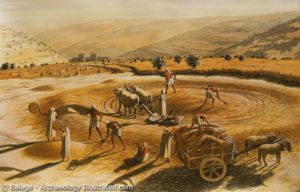
The farmer knows the correct method to use so as not to damage the grain he wants to extract. So also, God knows how to bring down the chastisement of judgment upon His people in order to release the choice grain.
Judah will come under attack from Assyria, but it will be God who delivers her. She will later be taken into captivity to Babylon, but it will be God who restores her and achieves His choice purpose of bringing forth His promised seed.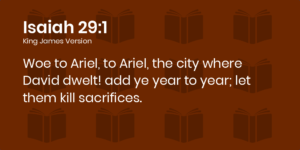
The prophecy against Jerusalem (here called ‘Ariel’ meaning ‘lion of God’ or ‘altar hearth’) continues in Chapter 29. The name ‘Ariel’ implies that she thought of herself as being as invincible as a lion. This is the root cause of the second woe.
Isaiah 29:1 1 Woe, O Ariel, Ariel the city where David once camped! Add year to year, observe your feasts on schedule.
We know that Ariel refers to Jerusalem from the context. Jerusalem is the city where David settled and where the feasts of the Lord are celebrated (29:1).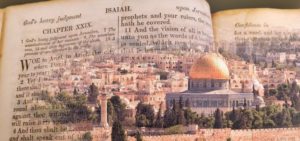
The Lord will bring the Assyrians to surround Jerusalem. From divine viewpoint, it is not the Assyrians besieging Jerusalem, it is the Lord. Yet God will prevent the Assyrians from gaining entrance and will drive them away.
Isaiah 29:3 3 I will camp against you encircling you, And I will set siegeworks against you, And I will raise up battle towers against you.
The Lord is using this humiliation in the lives of the people of Judah when it is besieged by Assyrians to call them back to himself. Judah’s covenant with Egypt and Syria cannot help her. God is her deliverer. And He promises to blow away their enemies like dust! (29:5). We will read how this happens in Chapter 37.
The Lord promises to conceal his mysteries from his people. It is because they draw near to God in their words, but they remove their hearts from Him. He describes the blindness of His people and their lack of discernment. As a judgement- the wisdom of the wise men will perish, and the discernment of the discerning will be concealed. What is hidden in the Old Testament becomes revealed in the New.
A third woe is introduced in verse 15. Men think they can secretly make their plans at night and hide them from God. He rebukes their foolishness:
Isaiah 29:16 16 You turn things around! Shall the potter be considered as equal with the clay, That what is made would say to its maker, “He did not make me”; Or what is formed say to him who formed it, “He has no understanding”?
After the judgment is over, God will offer His blessing of mercy. Notice how these are displayed in the ministry of Jesus,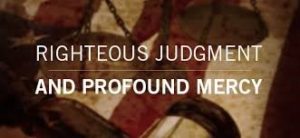
Isaiah 29:18-19 18 On that day the deaf will hear words of a book, and out of their gloom and darkness the eyes of the blind will see. 19 The afflicted also will increase their gladness in the LORD, And the needy of mankind will rejoice in the Holy One of Israel.
The fourth woe concerns Judah’s alliance with Egypt (Isaiah 30:1). In trusting Egypt, they are leaning on the arm of the flesh rather than the work of the Spirit.
Isaiah 30:1-2 1 “Woe to the rebellious children,” declares the LORD, “who execute a plan, but not Mine, and make an alliance, but not of My Spirit, In order to add sin to sin; 2 who proceed down to Egypt without consulting Me, to take refuge in the safety of Pharaoh and to seek shelter in the shadow of Egypt!
Do we consult the Lord when we make our plans? Do we ask God for wisdom? Do we act presumptuously? The Lord warns Judah of its futile alliance with Egypt.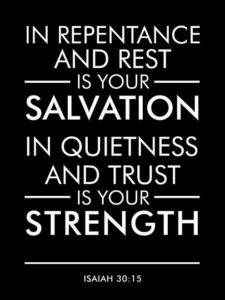
Isaiah 30:7 7 Even Egypt, whose help is vain and empty. Therefore, I have called her “Rahab who has been exterminated.”
The poetic synonym, ‘Rahab’ is given to Egypt. It is a name in Ugaritic literature for a female sea monster that appears strong but does nothing.
Isaiah is challenged by the Lord to put all these prophecies in writing as they will be a witness to the rebellious people who would prefer that Isaiah prophecy ‘illusions’ (30:8-11).
TODAY’S READING FROM THE NEW TESTAMENT – GALATIANS 3:23-4:31
In the last verse we read yesterday, (v.22) Paul said the Law was like a prison designed to show us that in its eyes all are convicted criminals in need of release. Christ releases the penitent believer from the prison of condemnation and bondage.
Now in verse 23, Paul uses the analogy of the Law being like a strict tutor assigned to take a child to school until that child comes of age and learns its need for Christ. Then the tutor’s services are no longer needed. So the Law was designed to bring us to Christ.
A child who came of age would lay aside its childish garments and put on a new toga. Paul uses this picture as an analogy of those who have identified with Christ (baptized into Christ) as having put off the old clothing of the law and have now clothed themselves with Christ. Under the law, they lived by duty. In this new relationship, they live by Christ. Together with all other believers they are all clothed in Christ’s sufficiency.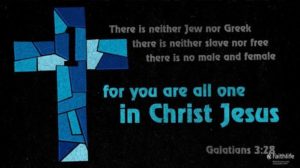
Galatians 3:28-29 28 There is neither Jew nor Greek, there is neither slave nor free man, there is neither male nor female; for you are all one in Christ Jesus. 29 And if you belong to Christ, then you are Abraham’s descendants, heirs according to promise.
As Abraham’s seed, the Jews were heirs of the promise. But in their experience under the Law, they were living still as slaves, waiting to become of age to claim what was legally deeded to them. Now that Christ has come, and fulfilled the Law on their behalf, the time set by the Father has arrived for both believing Jews and Gentiles to lay claim to the inheritance won for them. They are free to no longer act as slaves to the law, but sons, privileged to live in the Spirit as children of God.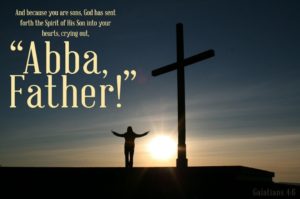
Galatians 4:6-7 6 Because you are sons, God has sent forth the Spirit of His Son into our hearts, crying, “Abba! Father!” 7 Therefore you are no longer a slave, but a son; and if a son, then an heir through God.
Now that we have a personal relationship with God as Father, it makes no sense to go back to being a slave to the elemental things such as the observance of feasts, that are only a shadow of which Jesus is the substance.
Scaffolding is used in the process of constructing an edifice. But once the building is complete, the scaffolding must come down. It is no longer useful, and it obscures the beauty of the finished work.
Paul implores those who are fascinated with the appeal of the Judaizers to return to the Law, to think twice! He urges them to be like he now is- free, instead of how he once was- living in bondage under the Law.
He reminds the Galatians that they have lost their joy and they have lost their first love. They originally received him with gladness, all because of what Jesus had done for him by grace. At that time Paul had a bodily illness affecting his eyes, and their loving sympathy was so strong they would have given up their own eyesight for him.
Galatians 4:15 15 Where then is that sense of blessing you had? For I bear you witness that, if possible, you would have plucked out your eyes and given them to me.
Now the Galatians were not so fond of Paul. They would prefer that he let them adopt a religion that fostered their self-righteousness according to the rules and regulations of the Judaizers.
Paul likens his personal labor to release the Galatians from their religious bondage to the painful process of childbirth. He wants them to be free from legalism. The law fails to make them Christlike. It takes Christ’s life to be Christ-like. He labors to convince them of this truth.
Once again, he appeals to his Torah loving audience to truly understand what the Torah truly teaches. He gives us an allegorical interpretation, inspired by the Holy Spirit, that contrasts two brothers. The are born of different mothers, Hagar and Sarah (Abrahams two wives). He also contrasts two mountains of Sinai and Zion to illustrate the difference between living by the Law or Living by Christ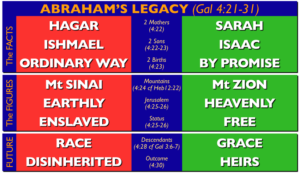
The son of the bondwoman (Ishmael) was not the son of promise and represents Sinai. The son of the free woman (Isaac) was indeed the son of promise, and represents Zion, where the presence of God dwells. We are not to live in slavery as sons of the law. We are to live in freedom as sons of God.
Grace is God doing for us what we could not do for ourselves. Sarah conceived and gave birth to Isaac when it was beyond her ability to do so.
Just as Ishmael persecuted Isaac, so those who adopt self-justifying religion through Law keeping, will persecute those who have the witness that they have been made righteous by grace through faith in Christ alone.
TODAY’S READING FROM THE BOOK OF PSALMS- PSALM 62:1-12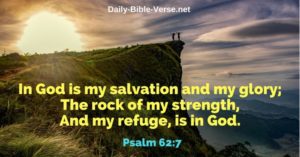
This psalm reflects David’s trust in God despite the opposition of his enemies who want to kill him.
David knows where his salvation comes from.
Psalm 62:2 2 He only is my rock and my salvation, my stronghold; I shall not be greatly shaken.
He is surrounded by those who delight in falsehood. They are deceived and deceptive.
David counsels’ others to put their trust in God as he has.
Psalm 62:8 8 Trust in Him at all times, O people; Pour out your heart before Him; God is a refuge for us. Selah.
We are not to put our hope in this world’s wisdom or riches.
Psalm 62:10 10 Do not trust in oppression and do not vainly hope in robbery; If riches increase, do not set your heart upon them.
Verse 11 is profound. God’s Word is once and for all truth. But how often when we hear it again, we discover new truth, so we feel we have never heard it before.
Psalm 62:11-12 11 Once God has spoken; Twice I have heard this: That power belongs to God; 12 And lovingkindness is Yours, O Lord, For You recompense a man according to his work.
TODAY’S READING FROM THE BOOK OF PROVERBS- PROVERBS 23:19-21
Proverbs 23:19-21 19 Listen, my son, and be wise, and direct your heart in the way. 20 Do not be with heavy drinkers of wine, or with gluttonous eaters of meat; 21 For the heavy drinker and the glutton will come to poverty, and drowsiness will clothe one with rags.
PRAY FOR THE NATIONS – NIGER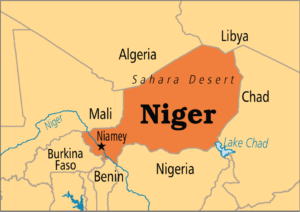
For a video in which we can pray with those from Niger:
https://prayercast.com/niger.html
Niger
Republic of Niger
Africa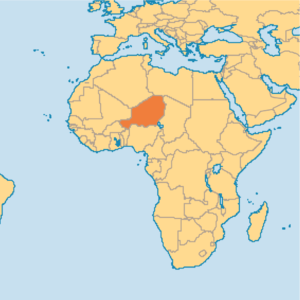
Geography
Area: 1,186,408 sq km
Sahara Desert in center and north. Only the southwest and a narrow strip along the Nigerian border in the south are savannah grasslands.
Population: 15,891,482 Annual Growth: 3.94%
Capital: Niamey
Urbanites: 16.7%
HDI Rank: 182 of 182 (UN Human Development Reports 2009)
Peoples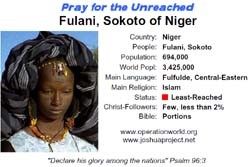
Peoples: 38 (76% unreached) All peoples
Unreached Peoples Prayer Card
Official language: French. Language of wider communication is Hausa Languages: 21 All languages
Religion
Largest Religion: Muslim
|
Religion |
|
Pop % |
Ann Gr |
|
52,442 |
0.33 |
2.1 |
|
|
21,541 |
0.1 |
3.7 |
|
|
Muslim |
15,436,986 |
97.14 |
|
Challenges for Prayer
Pray for the specialist Christian ministries in Niger, including:
- a) Aid and development projects for one of the world’s poorest countries should ideally uplift and then empower the people. Samaritan’s Purse, Impacting Niger, World Vision, Lutheran World Relief and many others try to invest wisely into the lives of the people by providing for their needs. Pray that such ministry by Christians would demonstrate the love of God and make an eternal difference in the lives of those impacted.
- b) Medical ministry is very effective in this deprived nation. SIM runs the Galmi hospital, and TLM runs the SIM-founded Danja hospital, which has the national referral center for leprosy as well as an ophthalmic center.
- c) The many prostitutes in the capital are the focus of a significant outreach by CAPRO. The problem of prostitution in southern Niger intensifies as shari’a law is enforced in northern Nigeria, but a lack of funds and personnel threatens this crucial ministry.
Media-oriented ministries include:
- a) Bible translation and distribution. SIL and SIM workers commit to translation programs in Tamacheq-Tawellemmet, Kanuri-Manga, Kanuri-Tumari, Fulbe (Fulfulde), Wodaabe and Tubu-Daza; there are active projects in eight different languages.
- b) Christian literature. Poverty and illiteracy are severe limitations. Literacy programs must be a key aspect of development programs, both Christian and secular. There are just two Christian bookstores in the country.
- c) Radio is a recent development in Christian ministry. EBM produces Christian programs for the national radio station and a commercial station. A Christian FM station, Radio Espoire, launched in Niamey in 2004 and includes spiritually and socially redemptive programming in several languages. Words of Hope is involved in program development and training.
- d) The audio-media ministry is inadequately funded and exploited. GRN has prepared messages in 36 languages/dialects of Niger. Solid-state audio and cassettes are vital in the contexts of poverty and nomadism.
- e) The JESUS film is now available in 11 languages.
PRAYER: O God, our God, You are so rich in love and mercy that You have sent Your Son in the fullness of time, to be born under the Law and to fulfill the Law on our behalf, so that Your promise might come to us of a new birth in Christ. So by the Holy Spirit, we cry ‘Abba Father’. We are so blessed to be Your children and to know that we are accepted in the belovedness of Christ our Lord and Savior. We rest in His finished work of righteousness, knowing that we are now complete in Him. Thank You for delivering us from bondage to the Law, to the flesh and the Satanic hold of the world system. We pray that You will keep us standing fast in this freedom, in Jesus’ Name. Amen.
